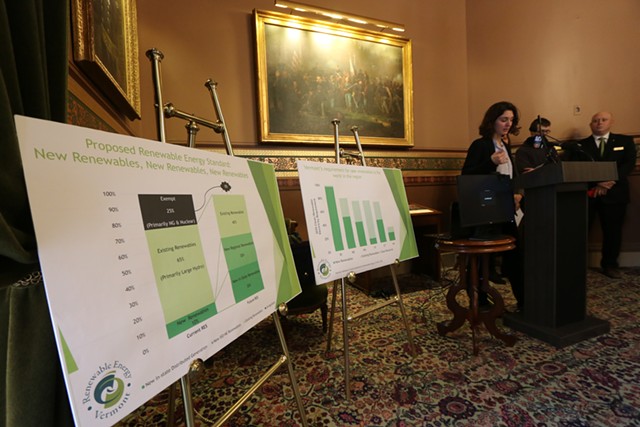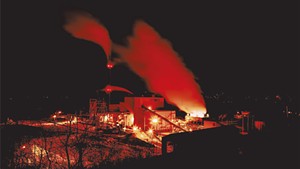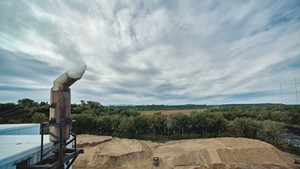
- Kevin McCallum
- Danielle Laberge
A group of solar energy system installers and activists gathered at the Statehouse to encourage lawmakers to accelerate the state’s push toward renewable power by revamping laws they claim have held the industry back.
“We need to celebrate renewables,” Rep. Caleb Elder (D-Starksboro) said. “It’s time for a comeback."
Elder said he is sponsoring a bill that would update and raise the bar on the state’s renewable energy standard. Its complex set of energy regulations requires utilities to purchase an increasing amount of power from renewable sources. By 2032, utilities must get 75 percent of their electricity from wind, solar, hydroelectric and other sources, with 10 percent generated in-state.
Some credit the regulations with helping to dramatically reduce the state’s emissions from the electricity sector. The state’s energy sector now accounts for just 2 percent of carbon emissions, according to the Energy Action Network.
Others nevertheless say the rule doesn’t go far enough and is filled with loopholes allowing utilities to take credit for power from decades-old power sources, like Hydro-Québec.
Elder said such credits should be eliminated. The existing law, he said, “is not a vehicle for encouraging renewable energy development.”
The proposed bill would raise the renewable-energy bar to 100 percent by 2030. It would double the amount of required in-state renewables to 20 percent by 2030 and triple it by 2035.
If the state is going to succeed in reducing emissions with electric vehicles and heat pumps, the grid is going to need a massive boost in renewable energy, Elder said. That means Vermont needs to make it easier to build solar and to stop allowing opponents to block projects that provide such environmental benefits.
“The climate crisis cannot be put in abeyance by NIMBYism,” Elder said.
The bill would also require that 30 percent of future renewables come from within New England by 2035. It would also make it easier to build community solar projects and would phase out renewable-energy credits claimed by utilities that generate electricity by burning wood, such as the Burlington Electric Department.
BED issued a press release after the event blasting the bill and saying it would saddle the city with “tens of millions of dollars in new power supply costs” that would not reduce carbon emissions from fossil fuels because the department is “already 100 percent renewable.”
Critics have countered that BED’s wood-fired McNeil Generating Station is the single largest source of carbon emissions in the state. BED calls the plant an important source of jobs and a cheap, non-fossil fuel power source for the grid.
Related In a Warming World, New Thinking Imperils Vermont's Wood-Fueled Energy Market

“We are disappointed that, in an effort to promote more solar development, [Renewable Energy Vermont] has chosen to advocate for phasing out local wood energy in Vermont,” BED officials wrote.
Renewable Energy Vermont put on the event. The bill is supported by the Conservation Law Foundation, 350Vermont, and the Sierra Club, which says Vermont significantly lags its neighbors in renewable energy development.
"At a time when the climate crisis faces our world, our nation, and our state, we must make clean energy progress,” the group wrote. “The standard that is in place today fails the test. Reform is overdue.”
Clarification, February 2, 2023: This story has been updated to reflect that Darren Springer's acknowledgement about McNeil Plant emissions were made in comparison to smaller plants.












Comments
Comments are closed.
From 2014-2020, Seven Days allowed readers to comment on all stories posted on our website. While we've appreciated the suggestions and insights, right now Seven Days is prioritizing our core mission — producing high-quality, responsible local journalism — over moderating online debates between readers.
To criticize, correct or praise our reporting, please send us a letter to the editor or send us a tip. We’ll check it out and report the results.
Online comments may return when we have better tech tools for managing them. Thanks for reading.